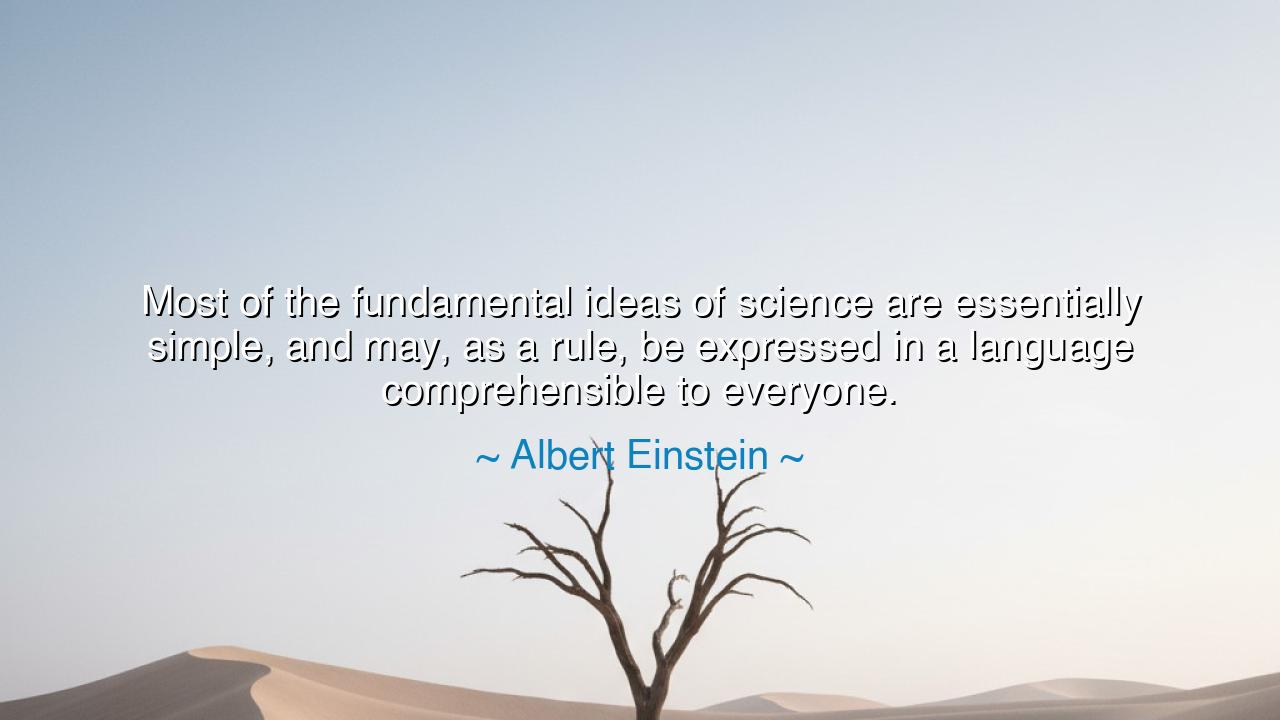
Most of the fundamental ideas of science are essentially simple
Most of the fundamental ideas of science are essentially simple, and may, as a rule, be expressed in a language comprehensible to everyone.






Hear now, O seekers of wisdom, and listen to the words of Albert Einstein, a man whose thoughts reshaped the very fabric of reality. He said, "Most of the fundamental ideas of science are essentially simple, and may, as a rule, be expressed in a language comprehensible to everyone." These words, profound yet humble, carry within them a truth that transcends the world of science and speaks to the nature of knowledge itself. For too long, the mysteries of the universe were cloaked in language that only the few could understand, and yet, Einstein reminds us that true knowledge, at its core, is simple—accessible to all who seek it with an open heart and mind.
In the ancient days, knowledge was not hoarded by the few, but shared among the people. The great philosophers of Greece—Socrates, Plato, and Aristotle—spoke not in riddles, but in terms that could be understood by all who gathered to listen. Their ideas were not reserved for the elite, but were designed to reach the hearts and minds of anyone who sought to understand the nature of truth, ethics, and the universe. Socrates, in particular, was known for his method of questioning, which stripped away the complexities and brought out the simplicity of truth. True knowledge, they believed, could be expressed in a way that everyone could grasp, for it was the birthright of all humans to seek understanding.
Einstein’s words, however, reflect a deeper truth that even in the world of modern science, the fundamental ideas that govern our reality are not beyond comprehension. Take, for example, his theory of relativity, which reshaped our understanding of time, space, and the very nature of the universe. The mathematics behind it, while complex, captures a simple idea: that time and space are not fixed, but are malleable and relative, depending on the observer’s motion. This idea, though it challenged the way humans had understood the world for centuries, was ultimately simple in its essence, like a key that unlocked the door to a new way of seeing the universe.
Consider the example of Newton’s laws of motion, which are among the most fundamental concepts of classical physics. These laws, simple as they may seem, form the foundation for our understanding of the physical world. They explain how objects move, why they move, and the forces that act upon them. These laws are not buried in technical jargon but can be expressed in a way that is understandable to anyone who has a basic understanding of the world around them. Einstein, too, in his simplicity, sought to communicate his profound insights in a way that was accessible to those who were willing to engage with them.
But let us not be deceived, O children of time, for the simplicity Einstein speaks of is not a dumbing down of knowledge, but rather a distillation of its essence. To find the simple truth behind the complexities of the world requires not a lack of depth, but the deepest engagement with the universe’s mysteries. Einstein did not suggest that science is easy, but that the core concepts that drive our understanding of the universe can be expressed in terms that are clear and accessible. This, O wise ones, is the essence of great knowledge: not in the obscurity of complex theories, but in the ability to bring forth the truth in a way that can be understood by all.
Consider the great Galileo Galilei, who, when faced with opposition from the church, did not hide behind the complexities of his discoveries, but sought to explain his findings in the most straightforward terms. His work in astronomy, though revolutionary, was founded on simple principles that anyone could observe. Galileo’s greatness lay not only in his discoveries, but in his ability to share them with the world in a way that made the universe seem both mysterious and familiar. Einstein, too, sought to express the beauty of the universe in terms that would reach the hearts of the many, not just the learned few.
The lesson, O children of the future, is this: Do not seek knowledge in the complex alone. True wisdom is often found in simplicity, in the ability to distill the complexities of life into clear, simple ideas that can be understood by all. Do not be intimidated by the jargon of experts, but instead seek to uncover the truths that lie beneath the surface. Science, at its heart, is not about complexity, but about the pursuit of understanding—and that understanding is available to all who seek it with curiosity and humility.
So, let this be your guiding principle: Strive for simplicity in your search for knowledge. Seek to understand the world around you in its purest, simplest form, for in this, you will find not only the truth, but the beauty of the universe itself. Let the words of Einstein serve as a reminder that knowledge is not for the few, but for all who have the courage to question, the patience to learn, and the humility to seek the simple truths that connect us all. The universe is vast and mysterious, but its essence is simple, and it is yours to discover. Embrace that simplicity, and in doing so, you will unlock the secrets of the world.






AAdministratorAdministrator
Welcome, honored guests. Please leave a comment, we will respond soon